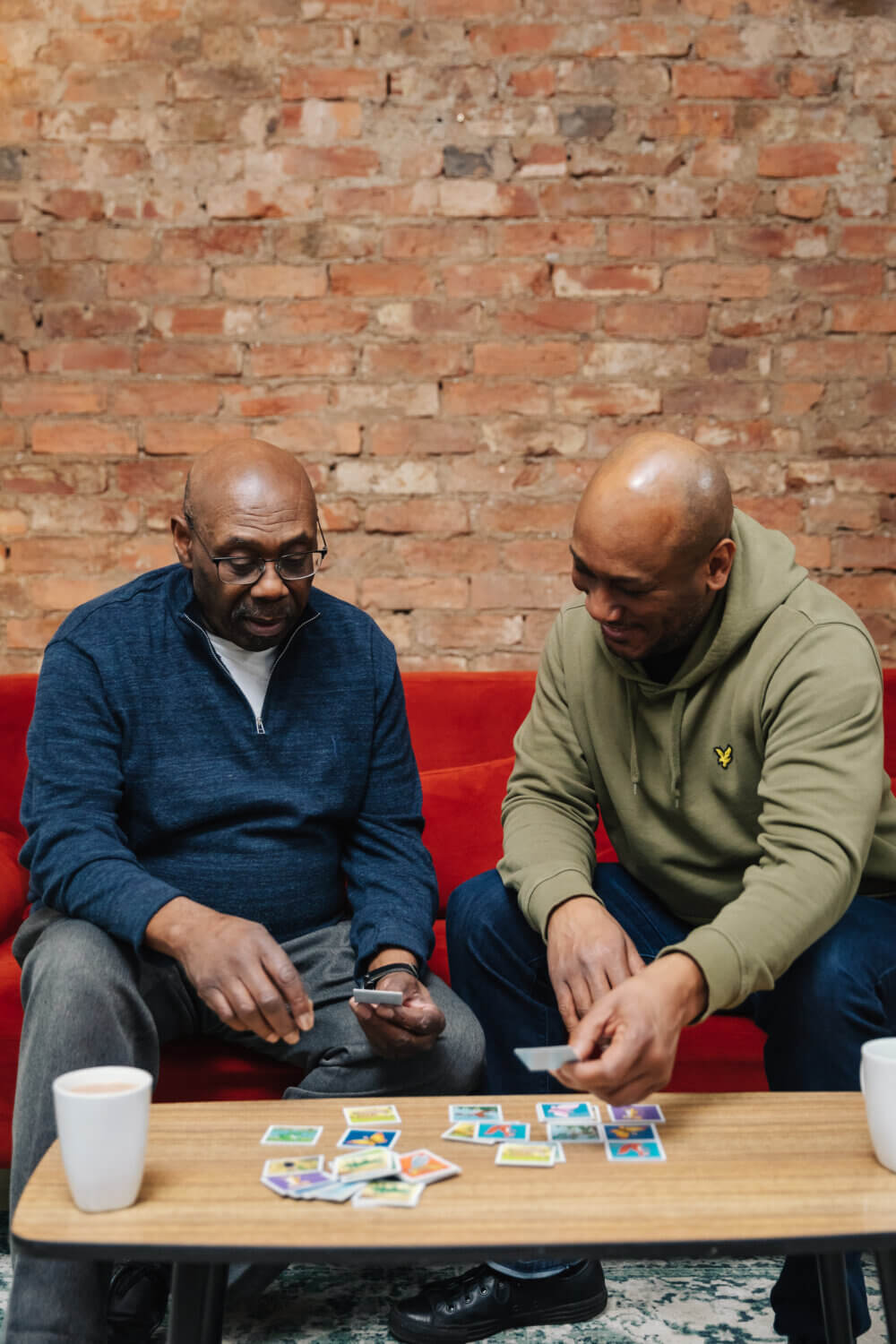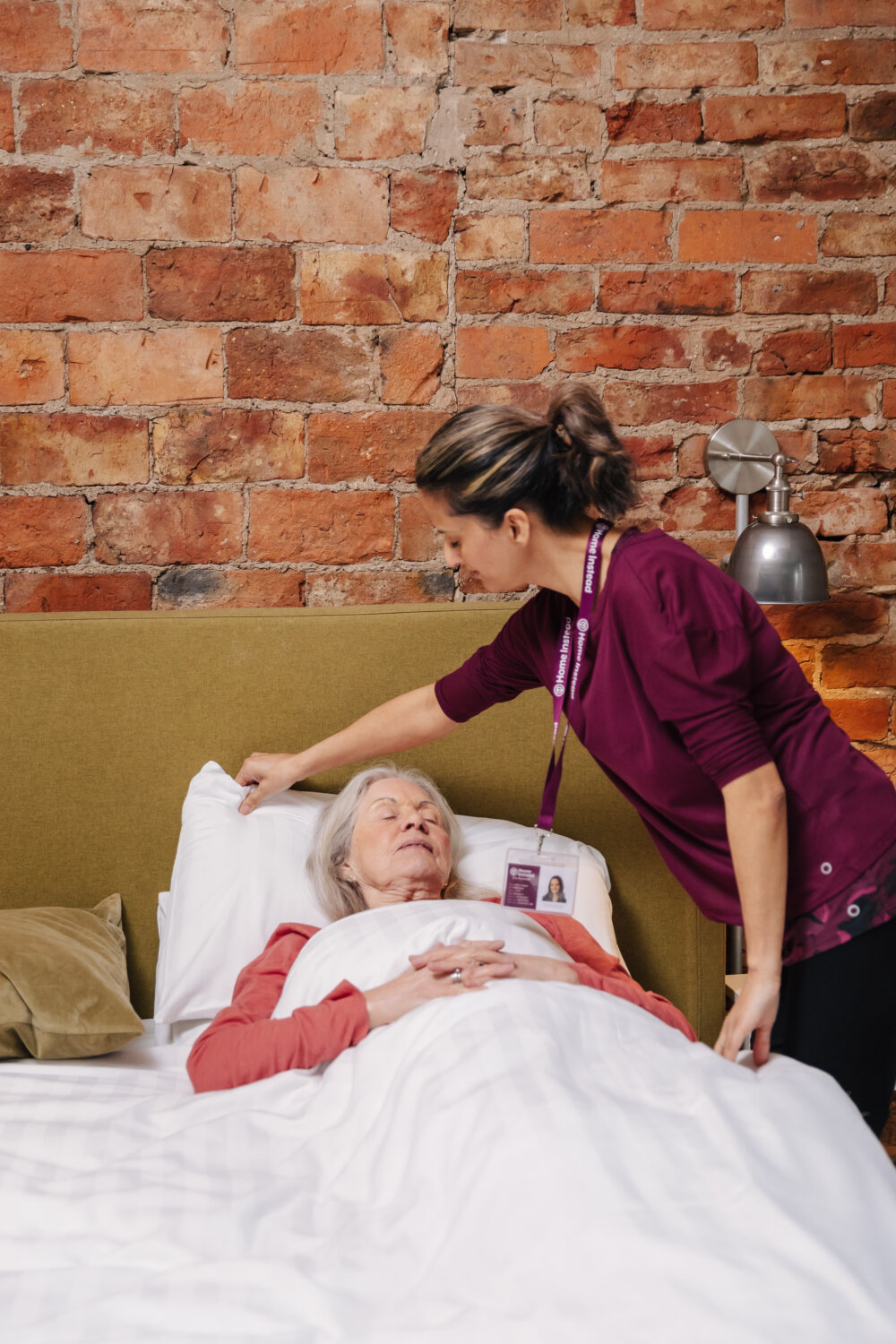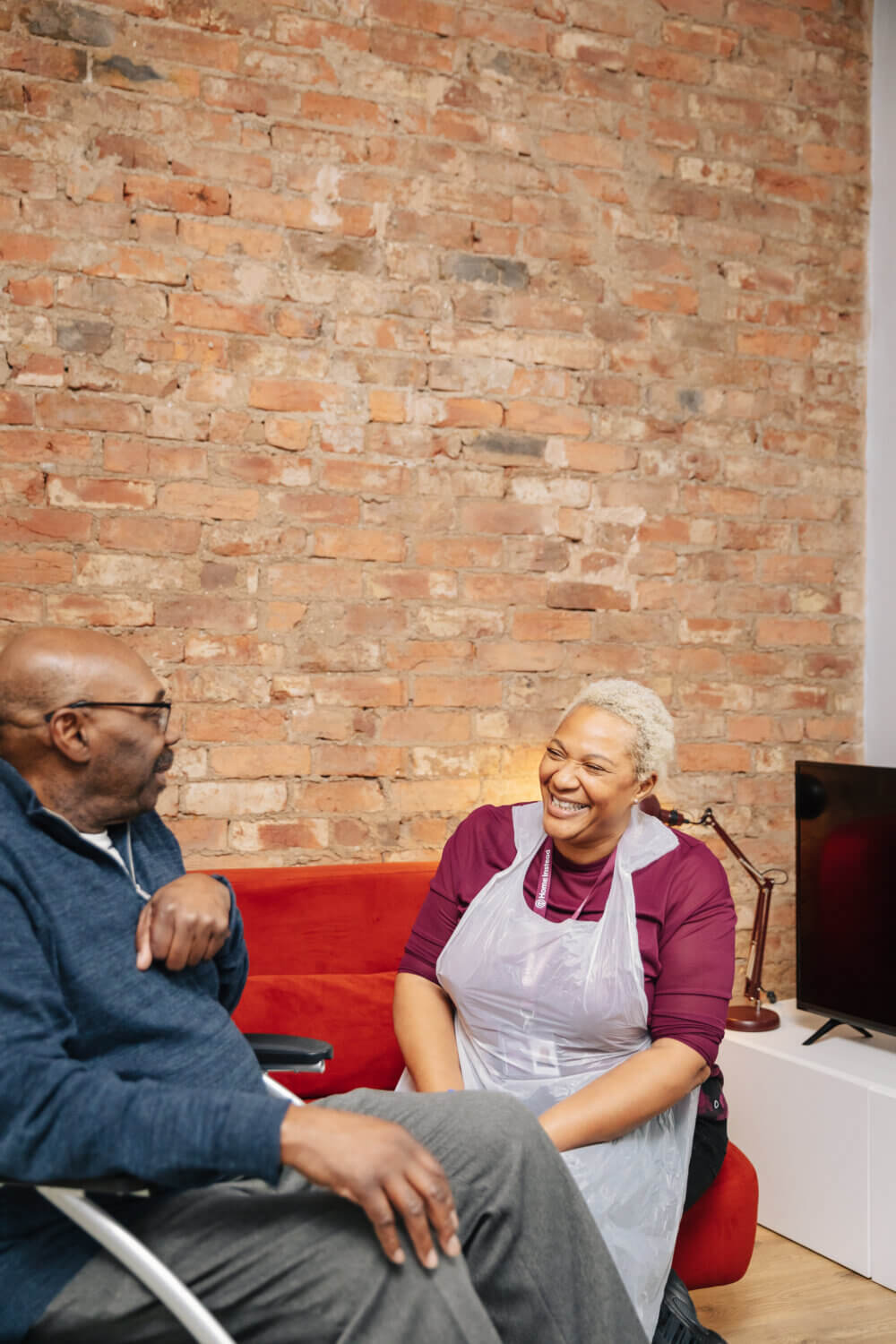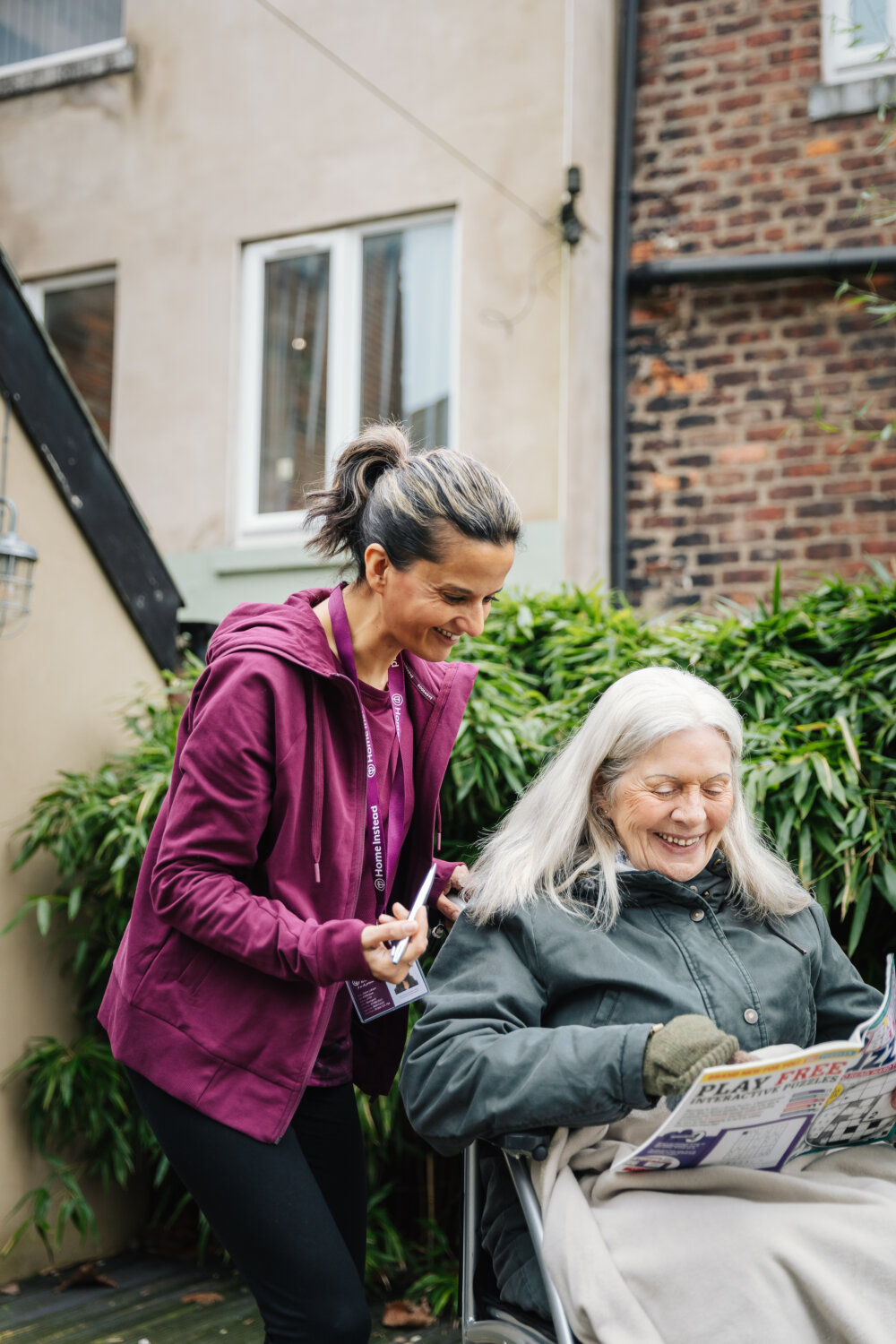Understanding the end of life care pathway
If you are living with a terminal condition such as cancer or dementia, the uncertainty around end-of-life care can be distressing, and is often upsetting to think about. However, for both yourself and loved ones caring for you during the end-of-life stages, it can help to understand some of the things you might encounter so you can plan ahead both logistically and emotionally.
Here, we are sharing what the End of Life Care Pathway is, as well as who it applies to, what to expect from it, who will be involved, how to plan ahead, and the support available to you during the process.
At Home Instead, our aim is to help people age positively and in place by bringing expert care to their home. For nearly 20 years, we have been providing the highest standard of care, and creating industry-leading training programmes for our Care Professionals that are accredited by nursing and medical professionals. Today, we are the world’s largest global home care network, supporting over 100,000 older adults with personalised, tailored care at home. So whatever questions you have about end-of-life care, we can help.
What is end-of-life care?
End-of-life care is the care required when someone is going through the final stages of an incurable illness, and requires specialist care to manage their pain and comfort as they approach the end of their life. This could be care that lasts for several weeks, months or years depending on the person’s condition and the speed at which their health deteriorates.
End-of-life care is difficult to talk about if you know you will need it yourself in future, or if a loved one requires it, but it is important to plan ahead to ensure you receive exactly the high-quality care you need. This will help to maintain your wellbeing and help your family members feel that your wishes are being prioritised.
The end-of-life stages of care can involve a lot of difficult emotions, and challenging physical symptoms that can be hard for family members to watch. Enabling someone with an incurable illness to die with dignity and without excessive pain is incredibly important, both for the person and for loved ones who are present.

What is the End of Life Care Pathway?
The End of Life Care Pathway is a more formal way to document a person’s needs and wishes as they approach the end of their life. It is a document that collects all information about a person’s care in one place, so all practitioners involved understand what needs to happen during this challenging time.
The End of Life Care Pathway should take into account things like:
- Where someone would like to be situated at the end of their life (i.e. at home, in a hospice, or in hospital)
- How they would like to be treated
- Decisions about whether the person should be resuscitated or not
- Who should be present
- Who should make any decisions about their care
- Any specific wishes or desires they have as they approach the end
- Any support needs of the family members who will be with their loved one at the end of their life
- Any religious or spiritual preferences the person has requested
- Any other needs they have to help them die with dignity
The End of Life Care Pathway is designed to collate all information about how the person would ideally like to spend their time as they approach the end of their life, and ensure that person-centred care remains a priority throughout the process.
Who does this help?
The End of Life Care Pathway is created when someone is living with a terminal illness (an illness that cannot be cured) and is thought to be in the final months or weeks of their life. A terminal illness could be a condition like advanced cancer, a dementia condition such as Alzheimer’s, motor neurone disease, advanced heart disease, or something else.
What is LCP and NEoLCP?
During your research into the End of Life Care Pathway, you may come across the acronyms LCP and NEoLCP.
LCP stands for the Liverpool Care Pathway, which was a previous care plan in the UK set out to help care for patients who were at the end of their life, to prioritise their wellbeing. While some positives could be drawn from this care plan, it was eventually criticised and later reviewed for a number of reasons.
Many people felt the pathway was unclear and ignored other elements of a patient’s care that could have shaped a more personalised approach – this was thought to cause additional suffering for terminal patients. In 2014 the LCP was replaced by the National End of Life Care Program (NEoLCP), which overhauled the way end-of-life care was carried out, and this remains the framework followed by health and social care workers involved in end-of-life care today.

Is end-of-life care the same as palliative care?
You may have heard the terms end-of-life care and palliative care used interchangeably, but there is a difference.
End-of-life care = This is for a person who is in the final weeks or months of their life, and who needs specialist care to ensure their pain is managed and they can die with dignity.
Palliative care = This is for a person who has a serious illness that requires specialist care, such as cancer. Although palliative care can be used at the end of someone’s life, it is not only used in this circumstance. Some people with a serious but non-life threatening illness can benefit from palliative care, as it focuses on pain relief and easing symptoms.
What can you expect during end-of-life care?
If you or a family member are preparing for end-of-life care in the future, you may be wondering what this will look like in reality, and who will be involved.
Concerning the location of end-of-life care, you can choose to go through this wherever you would feel most comfortable, and this might be a hospice, a hospital, in a family member’s home or in your own home. Many people with a terminal illness choose to stay at home surrounded by the people they love and their own belongings. In fact, research has found that 71% of people would prefer this option over a hospice, so if this is something you would like, you should not be discouraged from this choice due to convenience or a lack of home care options. Speak openly about your wishes with your loved ones and caregivers.
When it comes to who will be present during the end-of-life stage, a number of people may be involved in your care depending on where you choose to spend your final weeks or months. This could include your GP, other doctors, nurses or community nurses, hospice staff, counsellors, social care staff, chaplains, occupational therapists, complementary therapists, and more. In addition, in the majority of cases, family members will want to be present as much as possible.
If you are being cared for in a hospital or hospice, the internal staff there (such as doctors, nurses and other hospice staff) will oversee your care, or if you are being cared for in your own home, your care will be managed by your GP and supported by community nurses and carers.
End-of-life care should always be person-centred and tailored to your needs and wishes, so you have the right to let those wishes be known. The people around you – family, carers and medical professionals – should do their utmost to meet these wishes.
Can you plan ahead for the end-of-life stage?
It is always beneficial – no matter what age you are or your health situation – to have discussions with loved ones about what you would like to happen in the event that you require end-of-life care. This helps to make your wishes known for the future, and a document like the End of Life Care Pathway can ensure everyone involved in a person’s care is on the same page and understands what needs to happen in the months, weeks and days leading up to the end of a person’s life.
It is, of course, not always possible to predict when you will die, but if you have an advanced incurable condition and expect to reach the stage of end-of-life care within years, months or days, you should (if you can) speak to your loved ones and caregivers about anything that would make you feel more comfortable, or make you happy during this sensitive time.
Remember, everyone involved can benefit from an End of Life Care Pathway being put in place, as it helps to avoid situations where loved ones must guess what their relative’s wishes might be or make decisions for them that they feel unsure about, such as where they want to be at the end, their pain relief, resuscitation, organ donation, and more. By communicating your needs and wishes as early as possible, you can ensure they are met for your sake and to make the process more emotionally manageable for your loved ones.
It is also important to update these wishes as and when they change, so your End of Life Care Pathway remains up-to-date at all times. Although you cannot predict exactly what will happen in the final stages of life, having a plan in place can help to guide decisions, which can benefit everyone involved.
If you are looking to learn more about putting a Power of Attorney in place to make it easier for loved ones to make decisions during end-of-life care, you can read more in our article: How To Get Power Of Attorney For Ageing Parents

What support is available during end-of-life care?
When you or a loved one reaches the point where end-of-life care is required, you may be wondering what other support is available during this challenging time. This will usually be made clear to you if you are going through end-of-life care in a hospital or hospice, but if you are receiving this care at home, it isn’t always obvious what options you have.
If you have any questions about the process of end-of-life care at home, your GP can usually answer these for you and mobilise any community nurses, specialist care nurses or social care workers to help look after you during this time, and support your loved ones. They can also put in place things like complementary therapies, local support groups, and anything else available in your area that could provide pain relief, emotional support, logistical assistance, or general comfort during this time.
Many people who opt for care at home in their final months, weeks or days benefit from having carers present to help with everything from personal care to overnight care to mobility support and more. It is normal to worry that something may happen to you when you are alone, and you may feel more safe and content with a live-in carer present to help with any unexpected needs, manage pain, and provide companionship and comfort during difficult moments.
If you are looking to put home care in place, our award-winning home care at Home Instead could offer you the bespoke, person-centred care you need to make the end-of-life care process calm and easy for all involved. Arranging care for yourself or your loved one shouldn’t be stressful, especially not during such a challenging time, so if this is something you are interested in do reach out to the Home Instead team to discuss your needs and allow us to create a personalised package to support you.
What financial support is available during end-of-life care?
When it comes to the financial side of end-of-life care, there are many options available to ensure you get the personalised care you need, including NHS funding – you can speak to your GP about how to access the care you need and how to pay for this.
People receiving palliative and end-of-life care who are not eligible for NHS Continuing Healthcare may be able to access something called a Personal Health Budget, which can provide a more bespoke experience for those in their final weeks and months of life.
Paying for care can be a stressful consideration, but this is not something you should need to worry about during the end-of-life stage. Looking into your options as early as possible can help to put your mind at ease so you can focus on spending quality time with your loved ones.
Some of our other articles have useful information about things like the cost of home care, ways to pay for this, and financial benefits – you may wish to read these to learn more:

Home Instead is an award-winning home care provider and part of a worldwide organisation devoted to providing the highest-quality relationship-led care for older people in their own homes. Arranging care for yourself or your loved one shouldn’t be stressful, so whatever questions you would like answered, feel free to reach out to the Home Instead team to discuss your needs.